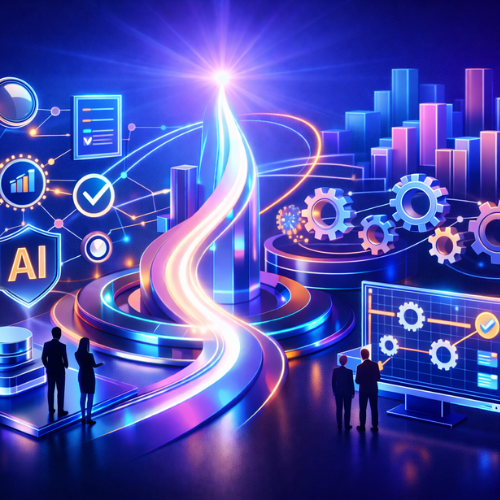Can you envision how it would feel to celebrate your 150th birthday—not just surviving, but thriving? Playing tennis, skiing, and keeping up with your great-great-grandkids. It sounds like science fiction, but groundbreaking longevity research and AI precision make this a real, achievable future.
As Dmitri Adler, Co-Founder of Data Society, puts it: “Aging is actually not much more than the decay of our DNA. What we’re seeing now are incredible breakthroughs in biochemistry that delay that decay—and AI is ensuring we do it with unmatched precision.”
The Biology of Aging: Delaying DNA Decay
At its core, aging occurs when the DNA in our cells begins to degrade. When resources are abundant, and life is comfortable, our bodies naturally favor cell division over repair. However research from the Harvard Longevity Lab has uncovered a way to trigger an epigenomic response, essentially signaling cells to repair rather than divide.

“These drugs, currently in trials, activate proteins to rebuild and repair DNA,” explains Adler. “By putting the body into a certain type of stress—what Harvard calls a ‘shock’—cells begin repairing themselves rather than just replicating.”
The results are stunning: delayed DNA decay, improved cellular repair, and ultimately – longer, healthier lives. However, these benefits are just the beginning because it’s rooted in biology. To further scale these breakthroughs and transform aging as we know it, AI is the key.
Where AI Changes the Game
Clustered regularly interspaced short palindromic repeats, (CRISPR), has become a topic of conversation around this development. According to the National Human Genome Research Institute (NIH), “it is a technology that research scientists use to selectively modify the DNA of living organisms.” However, CRISPR only provides a snapshot of gene expression at a single moment. Gene activity shifts over time due to stress, diet, and environment – making treatments inconsistent by not providing the whole picture. Is there a better way to predict this in a meaningful way? Yes, and it’s with the help of AI.
“AI enhances the precision of gene mapping by giving us a real-time, dynamic picture of the epigenome—how genes express themselves over time,” Adler explains. “It makes testing accurate, tailoring treatments to individuals while simultaneously reducing side effects like chronic inflammation or nervous system reactivity.”
The impact?
- Sharper Minds as We Age : “Imagine being as sharp in your 60s as you were in your early 20s,” Adler says. “Most people would pay a lot to get that level of mental clarity back.”
- Expanded Healthspan : Companies must establish robust data governance policies to define ownership, manage access, and ensure ethical practices throughout.
The AI-Longevity Revolution
Researchers are tackling the root cause of aging by combining AI with biochemistry. The annual Aging Research and Drug Discovery Meeting (AARD) brings together leaders in the field to discuss the latest advancements in “molecular, cellular, and organismal basis of aging and our search for interventions.” The latest conversations are based around how AI can continue to support these discoveries within the health and wellness space. With AI’s ability to uncover patterns at scale and apply personalized precision, the future of human health is being rewritten:
- More Accurate Diagnostics : AI dynamically tracks gene expression for consistent, tailored treatments.
- Better Drug Development : Faster identification of molecules and fewer adverse side effects.
- Higher Quality of Life : AI helps expand “healthspan”—the years we spend thriving, not just surviving.
Adler sums it up:
“AI won’t make you limitless like in the movies, but it will make you sharper, healthier, and more resilient. Living to 150 isn’t far-fetched anymore. Within our lifetime, we’ll see people thriving well into their 100s.”
The Future of Longevity Is Here
AI is not just helping us live longer—it’s helping us live better in a meaningful way until we get there. Beyond hospital visits and in-person care, Research from UMass Lowell is furthering AI’s impact by taking part in a “national effort to develop AI-based smart home technologies to improve the quality of home care.” With groundbreaking research and AI’s ability to unlock precision and scale, doubling the human lifespan is no longer science fiction.
The question is no longer if AI will reshape how we age—it’s a matter of how quickly.
Are you ready for this future?
How Data Upskilling and AI Literacy Drive Breakthroughs Across Industries
What if we could train ourselves, just like we train AI, to live longer, healthier lives? That’s the promise of AI and longevity. By combining groundbreaking biochemistry with the precision of artificial intelligence, researchers are discovering new ways to delay DNA decay, enhance cell repair, and optimize treatments for age-related diseases.
Using AI in healthcare isn’t just about diagnostics or hospital systems anymore, it’s about prevention and personalization. Algorithms are helping researchers analyze massive datasets to identify biomarkers of aging, track patient health in real-time, and recommend hyper-personalized wellness plans.
To fully unlock this future, AI upskilling is critical. Scientists, clinicians, and health tech professionals need tailored training to understand, apply, and innovate with these tools. It’s not just about learning how to use AI, it’s about learning how to think with AI.
This kind of innovation doesn’t belong in just one corner of medicine. It’s changing everything, longevity research, personalized treatment, and how we define health in the 21st century.
Curious how your team can get ahead of the curve? Learn more about our solutions.

